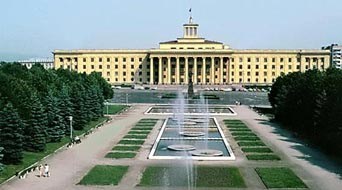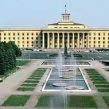
Moscow Excises “Separatist” Articles from Constitutions of Circassian Republics
Publication: Eurasia Daily Monitor Volume: 6 Issue: 213
By:

The parliament of the Republic of Kabardino-Balkaria has ratified changes in the republican constitution at the request of the Russian Prosecutor-General. Final agreement was reached on November 10 after prolonged debates followed by two unsuccessful attempts to vote on the issue (Gazeta Yuga, November 12).
The Prosecutor-General asked for the removal of two articles from the constitution of Kabardino-Balkaria. Both of them refer to the status of Kabardino-Balkaria as a sovereign republic in the Russian Federation. Article 4 states that: “The highest authority and the source of the power in Kabardino-Balkaria is the multi-ethnic people of Kabardino-Balkaria.” Article 9 goes on to state that: “The land, natural resources, rivers, forests, flora and fauna of the Republic are the heritage and the foundation of life and work of the people of Kabardino-Balkaria.”
The prosecutorial request had been based on a Russian federal Constitutional Court’s decision stating that the only source of power and the owner of all resources in the Republic of Kabardino-Balkaria (KBR) is the people of the Russian Federation. The head of the committee of law and government of the parliament of Kabardino-Balkaria, Zaur Apshev, opposed the prosecutors’ request, arguing that the same articles that they asked to be removed from the Kabardino-Balkaria’s constitution exist and are fundamental parts of the constitutions of Moscow, St. Petersburg, Tatarstan, Chechnya and many other regions of Russia. “Why does this fact not bother the Prosecutor-General and Constitutional Court?” Apshev said after asking the republic’s legislators to vote against the prosecutors’ request. “Why are we in Kabardino-Balkaria forced to change our constitution? It does not seem to me to be logical,” he continued (Gazeta Yuga, November 12).
The chairman of Kabardino-Balkaria’s parliament, Ilias Bechelov, supported Apshev’s opposition by replying: “They do not see violations inside the Sadovoe Koltso (Russian for the Garden Ring, the circular avenue around central Moscow), but can easily accuse someone of separatism” (Gazeta Yuga, November 12).
Kabardino-Balkaria’s prosecutor, Oleg Jarikov, the parliamentary deputy Victor Nesutulov and the deputy head of the republican presidential administration, Zalim Kashirokov, insisted that the request has to be supported and the constitution needs to be changed, “You can vote however you wish but the problem must be solved today,” Jarikov said. After the republican parliament voted twice against the changes in less than an hour, Nesutulov proposed that the next vote take place immediately and without anonymous voting. Kashirokov argued that the constitution has to be changed “if we want our republic ever to be removed from the Kremlin’s black list” (Gazeta Yuga, November 12).
The third and final attempt ended up with 39 open votes in support of the prosecutorial request, when 37 votes were needed for the decision to be final. The two “separatist” articles were thereby erased from the constitution of Kabardino-Balkaria.
The very detailed description of the voting process given above is necessary to show how the Kremlin’s democratic mechanism works in reality.
The recently changed constitution of Kabardino-Balkaria is what remains of the constitution of 1996. Since 2000, the constitution had been changed frequently. Seventeen articles of the KBR constitution involving laws on historical/cultural heritage and the ethnic rights of the indigenous population or laws on the republic’s status were changed or removed from the original version of the constitution.
For instance, in April 2006, Ruslan Abazov, deputy chairman of the KBR parliament’s committee on law, state building and issues of local self-rule, complained in an interview with Kavkazsky Uzel: “Practically at each session of the Kabardino-Balkaria parliament we consider changes in the republic’s constitution in connection with the fact that its articles do not conform to the Russian Federation constitution (www.kavaz-uzel.ru, April 5, 2006).
The first changes were aimed to ease the process: for example if the original constitution insists that only the Constitutional Court is authorized to change the constitution, according to the current version, one-third of votes of the members of the local parliament is sufficient to approve any changes in the constitution (https://constitution.garant.ru/DOC_30408244.htm/). The force for change is not limited to Kabardino-Balkaria. Two other republics in the Northwest Caucasus with a significant presence of ethnic Circassians are experiencing the same sort of pressure from the Kremlin. For example, the constitutions of Adygea and Karachaevo-Cherkessia were changed with the exact same intensity as in the neighbouring KBR.
The constitutional articles designating the Circassian language as the official language of the republics, equal to Russian, were among the first regulations erased from the constitution of Adygea, and later on from the constitutions of Karachaevo-Cherkessia and Kabardino-Balkaria. Another fundamental change made in the constitution of Adygea was in an Article 6, which states: “The constitution of the Russian Federation [and] federal laws has supremacy over the constitution of the Republic of Adygea and direct effect on the territory of the Republic of Adygea” (https://www.humanities.edu.ru/db/msg/62377).
The opposition that the local parliaments are displaying during the required voting shows the people and authorities of the Circassian republics are unhappy as well as suspicious of the policy that Kremlin is developing vis-a-vis one particular ethnic group. This factor, combined with the historical background of a brutally violent relationship between Russia and Circassia in the nineteenth century, does not seem to be the most intelligent way to convince the Circassians to give up their autonomy.




